Stuffed

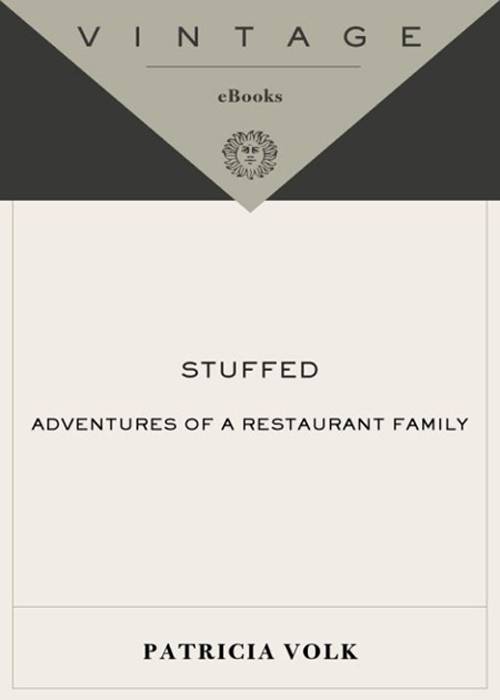
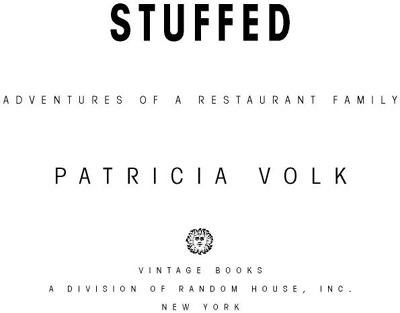
Table of Contents
For Polly and Peter, with utmost love
The art of being wise is the art of knowing what to overlook.
—WILLIAM JAMES
Praise for Patricia Volk’s STUFFED
“Unnervingly delightful. . . . In these gorgeous, generous pages, the sweetness never ends.”
—
The Miami Herald
“The food in Volk’s memoir is a backdrop for her dizzying family history. To her relatives, food was never just sustenance. It was the furniture they sat on . . . the thing that gave atmosphere and continuity to their lives.”
—
USA Today
“
Stuffed
is New York to the core. . . . Those who relish it—count me in—will savor just about every bite.”
—Jonathan Yardley,
The Washington Post Book World
“Packed with tender morsels, a celebration of the vibrant quirks of [New York]. . . . What the book really memorializes so beautifully isn’t just a restaurant, or a now-vanished style of eating, but a city in its rich and juicy prime.”
—
New York
magazine
“This collection of witty, anecdotal family portraits makes you feel that to be young, Jewish, well-off Manhattanites in the nineteen-fifties was very heaven.”
—
The New Yorker
“Delightful. . . . Smart, funny Volk celebrates and scrutinizes each family member and the foods they’ve loved, loathed and learned from over the years.”
—
Glamour
“The best book I’ve read in years.”
—Nancy Leson,
The Seattle Times
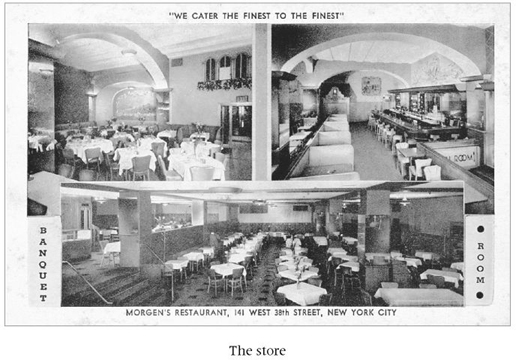
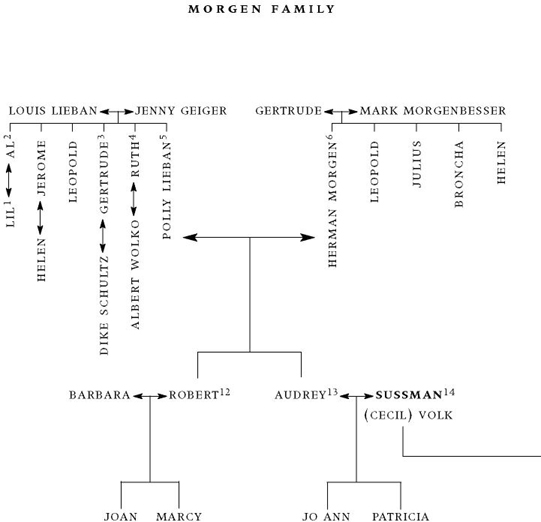
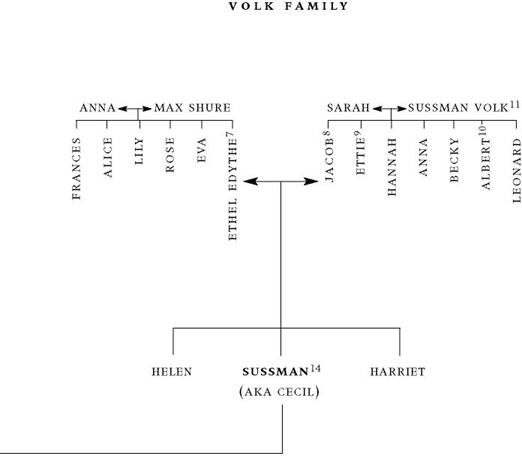
“I’ve never forgotten a rotten thing anyone has done to me”
The man who did Erich Maria Remarque’s root canal
She fainted the first time she saw her son
Taken hostage in the Bronx
“Best Legs in Atlantic City, 1916”
First man to carve meat in a window
First National Bank of Princeton’s first calendar girl
“The Greatest Wrecker of All Time”
The Collette of the Upper West Side
First man to stir scallions into cream cheese
Brought pastrami to the new world
No flowers were allowed in the apartment while he was overseas
Maker of the best chopped egg in the world
Invented the six-color retractable pen and pencil set
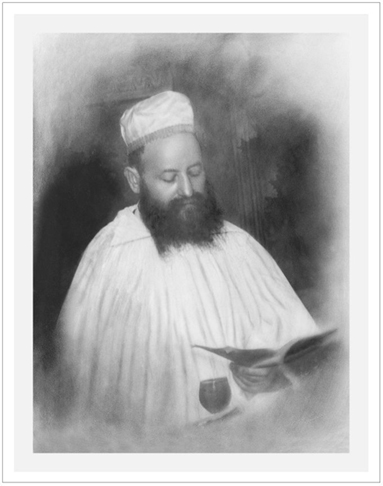
Sussman Volk, the man who brought pastrami to the New World (Collection of the Lower East Side Tenement Museum)
WHAT WE ATE
Our hallway was the color of ballpark mustard. The living room was cocoa, my mother’s wall-to-wall, iceberg green. The floor of the lobby was maroon-and-white terrazzo, like Genoa salami. When our elevator went self-service, the wood was replaced by enameled walls that looked like Russian dressing, the lumpy pink kind our housekeeper, Mattie, made by lightly folding Hellmann’s mayonnaise into Heinz ketchup with a fork. Daisies were the fried eggs of flowers, gladioli the asparagus. We were a restaurant family, four generations in a six-block radius. When you opened our fridge, food fell on your feet.
The restaurant was at 141 West Thirty-eighth Street, in the heart of the garment center. Designers, models, and buyers buzzed in, looked each other over, and stopped by tables to say, “Hey there!” or “How long you in town?” They dressed to show what they were capable of. “Sir!” Dad said with a military snap, flaring open your menu. He’d pull your chair and straighten your salt and pepper shakers whether you were Pauline Trigère or not. “Gus!” He’d raise a finger. “Ice water at twenty!” He set a hard party rhythm. He table-hopped. He had a story for you. On the floor, because he was so tall, he floated above hunched diners and waltzing waiters wearing red weskits he designed.
The garment center was a ghost town on weekends, so Saturdays Dad worked half a day. Late in the afternoon he’d come home hoisting a corrugated carton on his shoulder precision-packed with two pounds of sliced turkey breast, sliced ham, sliced Swiss, a side of bacon cut into rashers, fat-marbled steaks wrapped like presents in waxed paper, a rack of lamb, round white cardboard containers filled with number 20 shrimps (twenty to the pound), almond crescents, strawberry tarts glazed with strawberry gelatin, brown bags of Vassilaros Brothers coffee, whole smoked fish the color of my grandmother’s bangle bracelets, and Danish butter strip sold directly from the store to Nedick’s, the only product Nedick’s bought retail. Melons, string beans, celery like trees, cauliflower as big as the moon, pigs’ feet in aspic, and a glass jar of pickled green tomatoes. A quart of Russian dressing, a quart of Roquefort, a pint of cocktail sauce. A brace of mahogany ducks with a quart container of Sauce Montmorency. And a quart of my father’s famous Swedish mustard sauce:
Take equal parts Düsseldorf mustard and sugar
Add a little bit of oil and chopped chives
Those were the basics.
“Are you sick?” my mother would ask if I left a scrap from a twelve-ounce Delmonico. You weren’t considered fed unless you were in pain. The more somebody loved you, the more they wanted you to eat. In a restaurant family, you’re never hungry, you’re starving. And you’re never full, you’re stuffed. When anyone rose from the table without a two-handed boost, my grandmother wailed, “Please, God, don’t let him have gallbladder!”
I couldn’t walk down the street without running into someone whose hand-me-downs I wore, or who wore mine, or whose house I ate at, or someone I was glad to see even if it was only Nick the Popsicle Man, or Jimmy the old doorman, or Pat the building driver who chauffeured us the two blocks to school on days it snowed. Between Eighty-first Street and Eighty-seventh, from Riverside Drive to West End Avenue, my aunts and uncles lived, along with my great-grandparents, grandparents, friends, and even Benny, the man who sold penny candy, sunflower seeds, chewable lips, and tiny wax bottles filled with sugar syrup my sister told me would automatically fill up again if I could just touch the bottom of one with a bobby pin and not break it—an impossible thing to do.
Morgen’s was the restaurant, but we called it the store. It was the place I was a princess. Waiters winked at me. They plucked the white linen napkin from under my fork, twirled it high in the air, then draped it over my lap. They nodded when I ordered, admiring my choices. They told me jokes. And when I asked for a hamburger, my grandfather would raise his forearm, then smash through the kitchen IN door and grind a steak himself. On a good week I’d see my father twice: Saturday afternoon, when he got back from the store. And Sunday, our day. My sister and I would race to his bed, then snuggle. We’d kiss his cheeks. He’d suck our earlobes, then turn to my mother and say, “Audrey, I think this needs a little salt!” He’d press the soles of his feet against our stomachs and straighten his legs, and we’d be in the air, “Flying Angels.” Then Dad would drive us to woods, find a snake, and skin it. Or dissect a chicken in the kitchen and explain how the pebbles in its crop worked. Or we’d take the car to the Coney Island Freak Show and gape at the Walrus Woman, the Leopard Lady, and the Human Bullet, who was bald and had no arms and typed with his toes. We’d eat pink cotton candy on paper cones, then throw it up on the Tilt-a-Whirl. Starving, we’d head for dinner at Charda’s, Luchow’s, or the Maharajah Room at The Pierre. Before fusion cooking, before Austro-Asian, Afro-Shtetl, and Thai-Inuit hit New York, most restaurants focused on the food of a single country. In fancy places, it was served by people in regional costumes, and you were serenaded with “Oh, Chichorneya, ” “Allez-vous En,” or “The Mexican Hat Dance.” You’d have to eat, listen, and smile while someone plinked a balalaika at you. If I misbehaved in the restaurant, my mother would walk me outside to where the car was parked and lock me in until the meal was over. I would breathe against the window and write words in my wet breath: ASS, BITCH, WHORE. When I got home, I would take out my Christmas Book, a small spiral notebook with a list of everyone I made presents for. I’d draw a black tree next to my mother’s name, which meant one more Christmas she wouldn’t get a gift.
“What did I do that was so bad I had to be locked in a car?” I ask my sister.
“You were . . . oppositional,” she says, then adds with a voice full of sorrow, “I forgot about that.”
At the height of her anger, the apex of her rage, my mother used to say she was sending us to Mrs. Brown’s Orphanage.
“I don’t believe you,” I’d say.
“Is that so?” She’d pick up the phone and dial a number. My sister and I would listen in on the extension.
“Hello?” a woman’s voice said.
“Hello, Mrs. Brown? This is Mrs. Volk, and my terrible daughters are acting up again.”
“Oh really, Mrs. Volk?”
“Yes. Can I drop them at the orphanage tomorrow?”
Mrs. Brown would say why certainly, she had two empty beds, she’d be delighted to have us the very next day.
Although my sister was older, she’d burst into tears. She’d promise to be good. I was ready to go to Mrs. Brown’s. If my mother didn’t want me, I didn’t want her. In my sixth-grade autograph book she wrote:
If all your friends desert you
Pray don’t look for another
But come to the one who loves you best
Your dearest friend, your mother
Years later she told us her old friend Ruth Kahn had played the part of Mrs. Brown.
We were allowed to stare at freaks on Coney Island because they expected to be stared at. It was how they made a living. Staring at them was good for us. It would reinforce how lucky we were by sensitizing us to chance. But there were people in our neighborhood we had to pretend we didn’t see. The Tongue Lady had a green tongue that hung down her chest then rolled up fast as a lizard’s. On Broadway, the Glass Man had no legs and made music by tapping a spoon against eight glasses filled with graduated heights of water. One block north, the Organ Grinder seemed normal enough, but you could see every bone on his balding monkey. You gave the man whatever you had so the monkey wouldn’t starve. The most terrifying person in the neighborhood was the Black Widow. She ate lunch at Schrafft’s every day, a woman the size of a nine-year-old in turn-of-the-century widow’s weeds. Her black boots laced above her ankles. Her skin was talcum white. She ate without taking off her broad-brimmed hat and veil. If she caught you staring, the Black Widow would raise the veil and spit at you.
Because it was only one block from my grandmother’s apartment, we also ate at the Tip Toe Inn. When World War II was over, the day Uncle Bob got back from four and a half years on Saipan, that’s where my grandparents took him for his first civilian meal. Four and a half years my grandmother wouldn’t allow flowers in her apartment. Four and a half years my grandfather was retired from the restaurant business, refusing to buy black-market meat while his boy was overseas.
Uncle Bob studied the menu. He ordered turkey with stuffing, then took in the scene. The Tip Toe Inn was busy. People ate there all the time. They came at three in the afternoon for dinner because you could get the same meal at lunchtime prices. It was the kind of place you heard people eat and saw people talk. Uncle Bob looked around. For four and a half years he’d lived in foxholes. And here were people eating and laughing at the Tip Toe Inn. Uncle Bob raised his water glass, then put it down. His shoulders shook. Without a word my grandparents rose from their seats, linked their arms through his, and walked him home.
Since my mother only knew how to cook scrambled eggs and bacon, on Mattie’s night off we’d eat at her mother’s. I’d walk there straight from school and watch Lilly Brebner, the Jamaican housekeeper, singe quills off juicy nine-pound neutered roosters called capons on a gas stove. Seated around Nana’s table would be my great-grandparents; my grandfather; Nana’s older sister, Aunt Gertie, and Gertie’s son, Wally; her younger sister, Aunt Ruthie, and Aunt Ruthie’s husband, Uncle Albert; her older brothers, Uncle Jerry and Uncle Al; Uncle Bob and Aunt Barbara; and since somebody had to be at the store, my mother and my sister and me, but not my father.
At these meals my grandmother would force-feed my grandfather: “Eat, Herman, eat!” she’d beg. “Eat for
me
!” He’d throw his hands up: “No! Not another bite!” But despite his protests—“I can’t!” “Polly, you’re killing me!” “
Gutenyu,
I’m
dying
!”—she would drop another chosen morsel on his plate. The oyster of the capon, a clot of buttered toasted almonds from the string beans, the orphaned strawberry on the shortcake platter, a crimp of piecrust glossy with caramelized apple juice. “Eat! You don’t eat enough! A man like you! You work so hard! Just the end piece, darling? For me, Herman,
please
?”
My grandfather was being fattened. It was painful to watch. I worked up the courage to complain about it. “You don’t understand.” My mother smiled. “He loves it. He wants that food. He wouldn’t eat it if she didn’t do that. He would never give himself the best part.”
Not too long ago my sister and mother flew into town for the day. We planned to go to the Russian Tea Room for pelmeny (Russia’s tiny veal-filled answer to the wonton), then catch a matinee. I made the reservation for noon. When we got to the restaurant, the line was out the door.
“We’re never going to make curtain,” my mother said.
“I really want that pelmeny,” my sister said.
I pushed my way to the maître d’ and explained the situation. I reminded him we had a reservation.
“I’m sorry.” He shrugged. “There’s nothing I can do.”
“You see that woman?” I pointed to my mother. She was wearing a black cape with batwings and a high collar. It was chic, but it threw her gorgeous face into ghoulish shadow and made her neck disappear. “That woman was just
released
today. Right before we came here. She expected to be seated at noon. I can’t vouch for what she’ll do if she’s not seated
now.
”
The waters parted. We were whisked to a table. Three waiters pulled our chairs. The service was flawless. All of us agreed the pelmeny used to be better. As we were leaving, my mother turned to me and said, “What did you say to the maître d’?”
“I told him you were just released, Ma.”
She laughed, not believing me.
On long Sunday trips in our red convertible, we’d stop at Howard Johnson’s, where I had the clam roll. My sister and I sat in the back, but my mother would let me climb over if I said I was carsick. I’d press my feet against my father’s thigh and drop my head in her lap, and she’d run her fingers through my short, curly hair, starting at the back of my neck. “My favorite place,” she called the hollow there. I’d fall asleep to Lamont Cranston on the radio, the briny smell of tartar sauce on my fingers, and the sound of my mother whispering to my father, “Doesn’t she have gorgeous hair?”
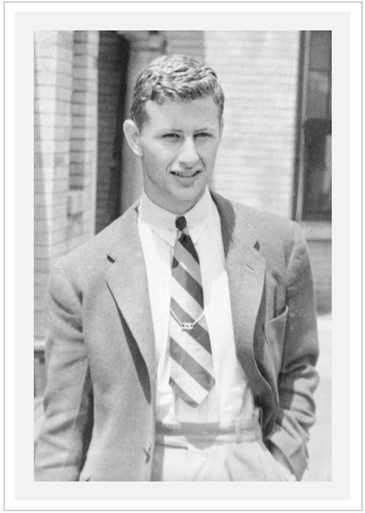
“Cecil” Sussman Volk (a.k.a. Stuff), around the time he invented the Six-color Retractable Pen and Pencil Set and the Hydraulic-powered Double-sided Garbage Can Brush